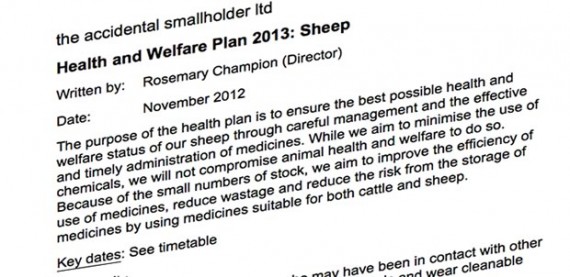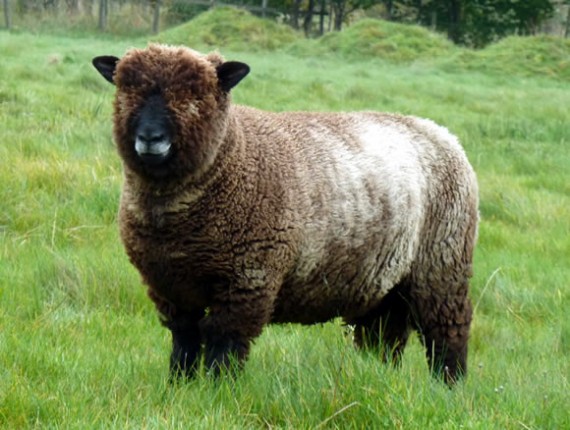Sheep Health & Welfare
Sheep have a reputation for being all too ready to die at the drop of a hat. This hasn’t been our experience so far, fingers crossed, but a lot of stress and potential heartache can be avoided through planning and prevention. While the routine use of antibiotics is to be avoided, the responsible use of chemical treatments and medicines has much to recommend it.
Health plans
I would recommend that all sheep keepers, no matter how small the flock, write a health plan. These aren’t just for large scale shepherds or for those seeking certain accreditations – they are a useful way of helping you to think through issues like biosecurity, introducing new stock and dealing with sick or injured animals as well as developing a strategy for preventing ill-health.
 We update our health and welfare plans annually
We update our health and welfare plans annually
Your vet will be happy to help you write it – after all, animal welfare is at the heart of what he does and he will see prevention as better than cure, too. However, do your own research too – vets are often used to dealing with large commercial enterprises and, therefore, the solutions required for that type of flocks.
As a new sheep keeper, it’s definitely worthwhile getting to know your vet, who will be happy to advise and may be able to provide you with small amounts of medicine – very useful to the small flock owner.
The articles in this section are very general: the appropriate plan for dealing with some of these issues depends on a number of factors including how many sheep you have, how much and what type of land you have, whereabouts in the UK you are located, how often you move sheep on and off your holding and so on. Your vet is therefore well placed to advise.
Know your sheep
The best place to start is by getting to know your own sheep. Your breed may be susceptible to particular problems, so check this with the breed society. Other than that, learn the signs of a happy, healthy sheep and try to spend a few minutes each day just observing them – you will soon be able to pick out any that are off colour.
 Knowing what your healthy sheep are like will help to spot problems early on
Knowing what your healthy sheep are like will help to spot problems early on
A healthy sheep should be active, should not be lame and should have no discharges from eyes, ears, mouth or under its tail. When she gets up from lying, she should stretch her body. If she gets up reluctantly and stands huddled, it is likely that something is amiss; if she won’t get up at all, there certainly is.
- Previous « Buying sheep
- Next Feet and foot trimming »

About Rosemary Champion
Rosemary lives on a 12 acre smallholding in Angus, in the east of Scotland, where she keeps Ryeland Sheep, Shetland cattle and assorted poultry. She was destined to be a smallholder from an early age.
Further Reading
 Sheep Medicine Phillip R. Scott |  Sheep Health, Husbandry and Disease: A Photographic Guide Agnes C. Winter |  The Veterinary Book for Sheep Farmers David Henderson |  The Sheep Keeper's Veterinary Handbook Agnes Winter & Judith Charnley |  Beautiful Sheep: Portraits of Champion Breeds Kathryn Dun |
Smallholding shop
When you click links below and make a purchase, this may result in this site earning a commission from eBay.

Pin Type Ram Crayon - Yellow each
Pin Type Ram Crayon. Yellow.… from £1.74 + p&p

Heptavac P Plus POM-VPS 100ml Includes Free Refrigerated Delivery
Heptavac-P Plus provides… from £45.74 + p&p

Pullover Teat Lamb
Pullover Teat. Fits over… from £0.88 + p&p

Super Sprayline Marker Aerosol - Red 400ml
Super Sprayline Marker… from £5.78 + p&p
















